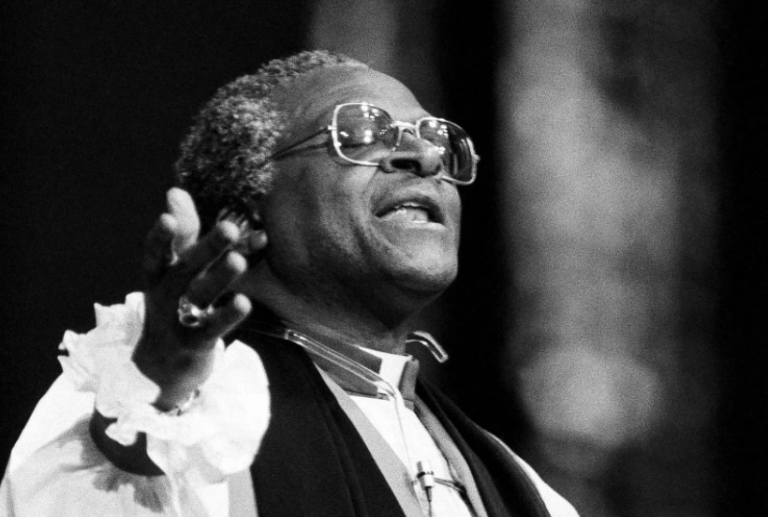by Dr. Jamie Gates
We lost Archbishop Desmond Tutu this past December. His life and teachings witness to a hope that was fiercely stubborn in the midst of relentless oppression. He is famous for saying “I’m not optimistic, no. I’m quite different. I’m hopeful. I am a prisoner of hope.“ From my perspective as a white kid who grew up with missionary parents in the latter years of Apartheid South Africa, there was little evidence at the time that Tutu had anything to be hopeful about. Tutu’s theology drove his interpretation of the events and his response. When Apartheid collapsed and the nation needed healing, Tutu lived out this hope by leading the country through a very public, peacemaking Truth and Reconciliation Commission.
I experienced the heart of Rev. Tutu’s hope several times when visiting him at St. George’s Cathedral in Cape Town. More than anything he said, the way “the Arch” served communion spoke volumes. He very intentionally served us the body of Christ, calling us to unity in three languages: his heart language Xhosa; English, our language; and the language of his former oppressor, Afrikaans.
The polarized times we live in are crying out for incarnate, embodied witnesses to justice, reconciliation and peace. Like Tutu, we have to draw from our deepest theological wells and on our most vulnerable selves, like the prophet Zachariah (9.12) calling us prisoners of hope.
I’ve spent a great deal of energy calling out injustice, attempting to amplify voices of the oppressed, naming and confessing my complicity and the complicity of Christians and the Church in the personal and structural sins of our time. As a Christian white cisgender middle class US citizen male there is much to confess, and my privileged education has afforded me the time and space to study and teach and write about justice and the oppressed. While this confessional work is an essential part of nurturing a prophetic imagination, I’ve often neglected a discipleship in hope. I often lack the discipline it takes to hold out hope for what doesn’t yet exist. When I find that I’m a self-important town crier trumpeting public pronouncements of impending doom to bolster my own status as a prophetic voice, I’m not a prisoner of hope.
Ever feel like a Hallmark card trying to comfort deep pain and fear with pithy sentiments? Sometimes I find our theology formulaic and sentimental, not taking the pain, the fear, the doubt very seriously. When I find myself promoting bumper sticker sentiments, t-shirt talismans, pulpit platitudes and Christian clichés, it’s probably just evidence of a thin veneer over a shallow faith desperately grasping at straws. Our times demand a more robust theology.
Naming injustice from spaces of privilege can be a hollow exercise without solidarity with those who suffer. Michelle and I once waded with a small group of weary travelers into the depths of the Book of Lamentations. It is dark, heavy, full of pain, full of despair. Our own pain from some of the deep wounds of the world came to the surface. We found ourselves desperately drawn to the few verses of light, of God’s great faithfulness and mercies that are new every morning (Lam 3.22-23). But living through the whole of Lamentations brought us more often to the places where teeth are broken with gravel, people are trampled in the dust… deprived of peace… deprived of justice (read the rest of Lamentations), and we were learning to lament.
It may seem backwards, but becoming a prisoner of hope means spending a tremendous amount of time in seemingly hopeless spaces, lamenting and abiding with those who suffer, and allowing others to abide with us.
Being a prisoner of hope builds on the ability to name and confess injustice, builds on the ability to lament and abide with those who suffer. In these spaces we become desperately dependent on God and on a faithful Christian community seeking to embody God’s hope for the world.
We are not prisoners of hope in the sense that we set doubts thoughtlessly aside, but it does mean that we are not free to believe only what we can see with our limited eyesight. It means letting go of the security we find in defining and controlling our circumstances, trusting God has something more beautiful in store. It means letting go of the safety we find in a cynicism that leaves us with only criticisms of the way things are and with no deep commitments to move toward the way things should be.
It means setting aside performative justice so that the deeper work of justice, reconciliation and peace can flow from God’s work in our midst.
After Friday morning communion, “the Arch” would invite us over for coffee and conversation, as he did for all visitors. You’d think he’d be content in his later years with the justice and peacemaking work that he accomplished. But even in his 80s, he refused to be consoled if there were still people suffering and divided in the world. Tutu’s life, his way of being in the world, shouted his theology, his faith in God’s reign breaking into the world, his faith that God’s people are to be embodied witnesses to that hope-filled, peace-making way of living that can transform the world as all are reconciled to God and to one another.
The Arch continued to decry injustice publicly, to mourn with those who mourn, and to serve communion in Xhosa, English and Afrikaans until finally his strength gave out. He died a prisoner of hope.
May we live a theology that allows us to do the same.
 Rev. Dr. Jamie Gates is a cultural anthropologist, current Professor or Sociology and former director of Point Loma Nazarene University’s Center for Justice & Reconciliation who pursues the connection between faith, scholarship and activism. He’s an Everyday Peacemaker whose passion, scholarly activity, and activism include immigration and border relations as well as racial and economic justice.
Rev. Dr. Jamie Gates is a cultural anthropologist, current Professor or Sociology and former director of Point Loma Nazarene University’s Center for Justice & Reconciliation who pursues the connection between faith, scholarship and activism. He’s an Everyday Peacemaker whose passion, scholarly activity, and activism include immigration and border relations as well as racial and economic justice.

